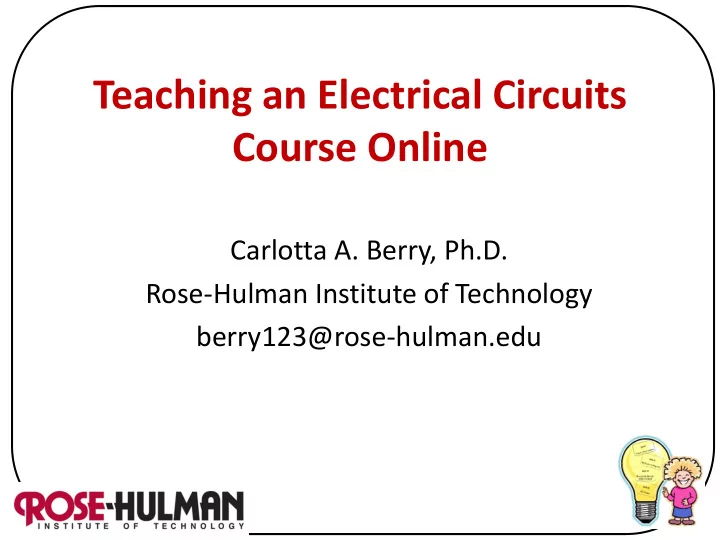

Teaching an Electrical Circuits Course Online Carlotta A. Berry, Ph.D. Rose-Hulman Institute of Technology berry123@rose-hulman.edu
Motivation • Allow students to get ahead or stay on schedule in the curriculum • Allow students to take class while on internships, co-ops, REUs • Provide same quality of instruction as the on- campus course
Course Overview • Electrical systems course for non-majors • Sophomore-level course • Semi-synchronous • DC and AC circuits • KCL, KVL, Thevenin/Norton • Operational Amplifiers • Phasor Analysis • AC Power • Integral lab component • Summer 2013/14
Lab Assignments • Prelab - Analytical and Simulation using MultiSim • Ni myDAQ – power supply, multimeter, function generator, oscilloscope • Breadboard, resistors, capacitors, inductors, op amps, voltage regulator
Comparison to On-campus Course • Same Syllabus • Same Calendar Midterms 36% • Same Lab Manual Final Exam 26% • 3 - 50 minute lectures Homework 10% • 1 - 150 minute lab • partial lecture notes Labs and Memos 15% • 3 midterms Lab Practical Test 5% • 2 lab practicals Quizzes 5% • 10 quizzes • 10 homework assignments (MasteringEngineering)
Course Expectation Meeting • Be more focused, disciplined, and independent • Level of difficulty • Scale on-campus course by 1.5 • Test of Online Learning Success (ToOLS) self- assessment • Textbook • Study Guide • Lab Manual • Lab Kit • NI myDAQ
Instructor Interaction • Piazza message board for anonymous posts • Weekly Google Hangouts to review quizzes, exams, homework • Moodle learning management system for quizzes, exams, discussion board
Online Lecture Videos on YouTube • Same lecture and notes used in the face to face class but there was no opportunity to stop and ask questions • Benefit of rewinding and watching multiple times • Still include partial lecture notes
Concept Quizzes • Weekly on Moodle • Typically 10 questions • Multiple Choice • Random Questions • Timed • Assessed students mastery of prior week’s concepts
Online Homework • MasteringEngineering • No time limit • Fill in the blank but many opportunities to get hints and help • 3 to 6 tries to arrive at the correct answer • Students could work through out the week
Exams • Exams were handwritten and scanned and uploaded to Moodle • Typically 4 to 5 open ended questions that involved hand calculations
Pre-labs & Labs • Lab manual with images of circuits • Supplemental lab videos on NI website on Multisim and using myDAQ • Supplemental videos on using a breadboard, building circuits, and using lab equipment
Results • 28% of students rated Grade Results the course a 9 or higher n = 20 with respect to 7.2 7 difficulty 6.8 6.6 • 71% of the students 6.4 6.2 thought the labs were 6 5.8 the most difficult part 5.6 5.4 of the online course earned A, B, or C earned D or F withdrew
Comparison to Face to Face Classroom
Qualitative Results • Debugging and building • One student felt that circuits own their own there was actually more was the biggest interpersonal challenge interaction with the professor • No real time help was challenging • Timed quizzes were too difficult for new • Hard to communicate material circuit problems electronically • Engagement increased by 50%
Conclusions and Recommendations • Similar level of • Piazza encouraged engagement but students to engage with sometimes more for each other online course • Randomize component • Respond to all questions values and questions on in all formats within 24 quizzes, practicals and hours exams • Use screen sharing • More lab review at software for questions expectation meeting and problem solving • Make attendance mandatory at virtual office hours
More information • Carlotta A Berry – berry123@rose-hulman.edu • Course Study Guide – http://www.rose- hulman.edu/~berry123/Courses/ES203.html • Video Lectures – goo.gl/KXKx2M
Recommend
More recommend